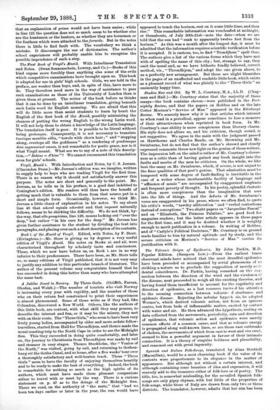Studies New and Old. By W. L. Courtney, M.A., LL.D.
(Chap- man and Hall.)—Mr. Courtney states that the majority of these essays—the book contains eleven—were published in the Fort- nightly Review, and that the papers on Hobbes and on the late Cotter Morison's " Service of Man " appeared in the Edinburgh Review. We scarcely know why it is that articles which interest us when read in a periodical, appear sometimes to lose a measure of their attractiveness when reprinted in book form. In Mr. Courtney's case ability is more conspicuous than literary charm. His style does not allure us, and his criticism, though sound, is not suggestive. We agree in the main with the judgment passed on Hawthorne and Charles Reade, on Mr. Browning and Mr. Swinburne, but do not find that the author's shrewd and clearly expressed comments throw new light on the genius of these writers. The impression left on the mind is rather of Mr. Courtney's clever- ness as a critic than of having gained any fresh insight into the faults and merits of the men he criticises. On the whole, we like best the essay on Mr. Swinburne, which, if severe, is not unjust to the finer qualities of that poet's genius. That admiration must be tempered with some degree of fault-finding is inevitable in the case of a writer whose inexhaustible facility of language and " affluence of music " are accompanied by exaggerated emphasis and frequent poverty of thought. In his poetry, splendid rhetoric is often more conspicuous than the imagination that sees into the life of things. And the defects of Mr. Swinburne's verse are exaggerated in his prose, where we often find, to quote his critic's words, "tawdry alliteration ' and "verbal contortions instead of conceptions." Two slight papers on "Jacqueline Pascal" and on " Elizabeth, the Princess Palatine," are good food for magazine readers ; but the latter article appears in these pages for the first time, and it may be doubted whether it is weighty
enough to merit publication in a volume. In writing of Hobbes, and of " Carlyle's Political Doctrines," Mr. Courtney is on ground made familiar to him by natural aptitude and by study, and the severe criticism on Morison's " Service of Mau " carries its justification with it.






































 Previous page
Previous page